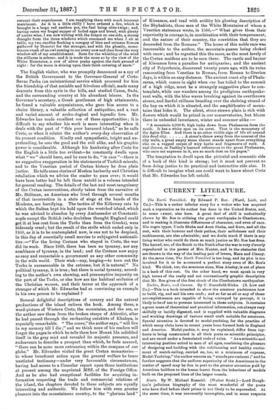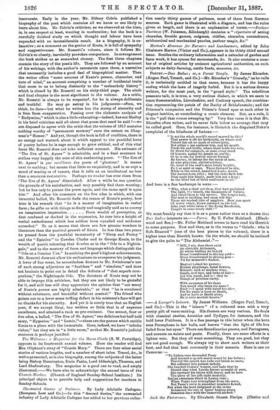Seals. By W. Michael Rossetti. (Walter Scott.)—Lord Hough- ton's judicious
biography of the most wonderful of the poets who have died before their prime is not likely to be superseded. At the same time, it was necessarily incomplete, and in some respects inaccurate. Early in the year, Mr. Sidney Colvin published a biography of the poet which contains all we know or are likely to learn about him. Mr. Colvin's criticism, as we observed at the time, is, in one respect at least, wanting in moderation; but the book is a ,carefully finished study on which thought and labour have been expended with no inconsiderable result. As a biography, it is ex- haustive ; no a comment on the genies of Keats, it is fall of sympathy and suggestiveness. Mr. Rossetti's volume, since it follows Mr. Colvin'a an closely, inevitably provokes comparison. In arrangement the book strikes us as somewhat clumsy. The first three chapters contain the story of the poet's life. They are followed by an account of his writings, with the author's comments upon them, a narrative that necessarily includes a good deal of biographical matter. Then the writer offers "some account of Keata's person, character, end tarn of mind," an account comprising Et number of incidental traits that seem to us to belong distinctly to the "melancholy history" which is closed by Mr. Rossetti on his sixty-third page. The ninth and final chapter is the most significant in the volume. As a critic, Mr. Rossetti is always to be respected, for he ie always deliberate and truthful. He may go astray in his judgments—often, we think, he does—but what he writes bee the stamp of sincerity and is free from exaggeration. Passing over the elaborate analysis of " Endymion," which is also a little exhausting—indeed, has not Shelley in his brief criticism said all about that poem that need be said 7—we are disposed to agree with the critic that the volume of 1817 contains nothing worthy of "permanent memory" save the sonnet on Chap. man's "Homer." And yet, though the book is full of crudities, there is an energy and warmth about it which appeal to the youthful lover of poetry before he is sage enough to grow critical, and of this vital force Mr. Rossetti does not take sufficient account. His estimate of "The Eve of St. Agnes" is admirable, and in a final sentence ha strikes very happily the note of thin enchanting poem. "'The Eve of St. Agnes' is par excellence the poem of 'glamour.' It means next to nothing ; but means that little so exquisitely, and in no rapt a mood of musing or of trance, that it tells as an intellectual no leas than a sensuous restorative. Perhaps no reader has ever risen from ' The Eve of St. Agnes' dissatisfied. After a while he can question the grounds of his eatisfaction, and may possibly find them wanting ; but he has only to pernee the poem again, and the came spell is upon him." And after his comment on the five odes in which, with one immortal ballad, Mr. Rossetti finds the cream of Keats's poetry, how true is his remark that " he is a muter of imagination in verbal form; he gifts us with things so finely and magically said as to convey an imaginative impression From wealth of perception, at first confused or docked in the expression, he rose into a height of verbal embodiment which has seldom been equalled and seldomer exceeded." To on it seems that there are few greater wonders in literature than the poetical growth of Keats. In less than two years he passed from the youthful immaturity of " Sleep and Poetry" and the " Epistles" to Cowden Clarke and to George Keats, to the wealth of poetic colouring that dazzles us in the Ode to a Nightin- gale," and to the mastery of form and language which distinguish the "Ode on a Grecian Ern." In noticing the poet's highest achievements, Mr. Rossetti does not allow his enthusiasm to overpower his judgment. A lover of fine verse:he nevertheless demurs to Mr. S winbarae's use of such strong adjectives as " faultless " and "absolute," and does not hesitate to point out in detail the defects of " that superb com- position," the Nightingale Ode. The devotees of Keats may not be able to impugn this criticism, but they are not likely to be grateful for it, and still less will they appreciate the opinion that " not many of Keats's poems are highly admirable," or that "he is emotional without substance, and beautiful without control." The friend who points out to a lover some trifling defect in his mistress's fade will get no thanks for his sincerity. And yet it in surely true that no English poet, if we except Gray, has written so little that is of supreme excellence, and attained a rank no pre-eminent. One sonnet, four or five odes, a ballad, " The Eve of St. Agnes," ono delicious but half-told story, "Hyperion " and " hamie,"—theee are the poems which entitle Keats to a place with the immortals. Here, indeed, we have "infinite riches," but they are in "a little room," so that Mr. Rossetti's judicial sentence is perhaps justified.







































 Previous page
Previous page